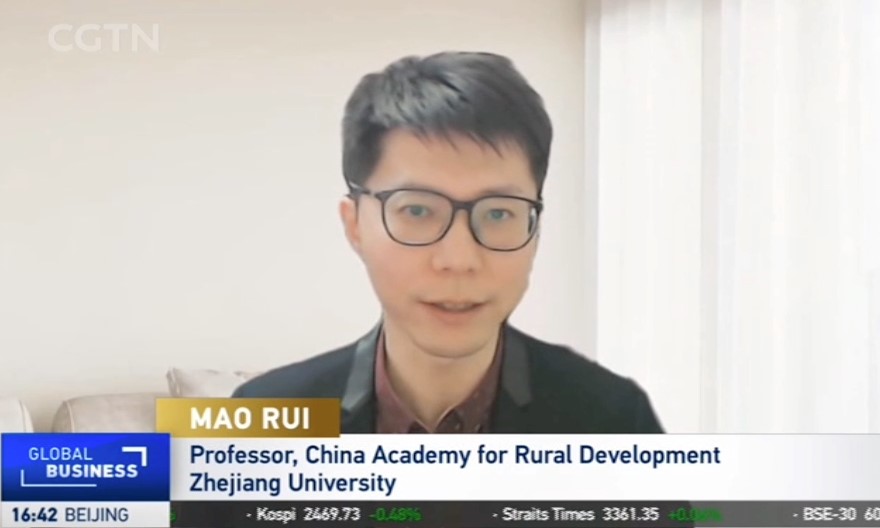On Feb. 10th, 2023, MAO Rui, professor of School of Public Affairs, Zhejiang University, accepted the interview of Global Business of CGTN, in which he shared China’s measures to maintain stable price and security of grain and food against the backdrop of rapid global inflation.
Prof. Mao said the year 2022 witnessed a year-on-year increase of 2% in CPI and an index increase of 2.8% in food price, which is higher than that of 2021, but still markedly lower than 14.3%, increase of global food price index released by FAO. The policies for stabling grain and food prices play a big part in it. On import, China launched a reduction and substitution campaign for corn and soymeal, increased broken rice imports, and for the first time imported corn from Brazil to meet the shortage for animal feed. On production, China strove to improve the production of soybean and promote the technology of strip complex planting of corn and soybean. On distribution, China established a forceful and efficient grain stock and distribution system and emergency respond system. China’s capacity for inter-province reallocation of grain has also been strengthened. The following are extracts from the interview:

China adopted a number of efficient and effective measures to maintain the grain and food prices stable. To tackle import risks brought by a series of geopolitical tensions and extreme weather last year, China launched a reduction and substitution campaign for corn and soymeal – the two most important grain imports – to reduce the import demand for animal feed. Thanks to that, the quantity of grain imports declined by about 11%. China also sought alternative import sources. It imported 1.2 million tonnes of corn from Brazil, which was the first time of corn imports from there and accounted for roughly 15% of corn imports from Ukraine in 2021. It has also increased rice imports, primarily broken rice for animal feed, by more than 30%, which also for the first time exceeded China’s import limit quota. This provided an important substitute for corn as the global maize price rose by 25% last year.
The government has also provided specific subsidies to encourage the companion planting of corn and soybeans, which could increase soybean yield while ensuring a steady output of corn. Actually, 2022 was the first year for China to promote a large-scale implementation of this planting mode.
Aside from stabilizing imports and production, China established a forceful and efficient grain stock and distribution system. China's domestic grain purchases last year are expected to reach 400 billion kilograms, keeping in line with the level we see in previous years. Relying on the bones and bloods of infrastructure through roads, rails and water, and thanks to response plans to grain emergencies made by all levels of government, China’s capacity for inter-province reallocation of grain has already reached 250 million


